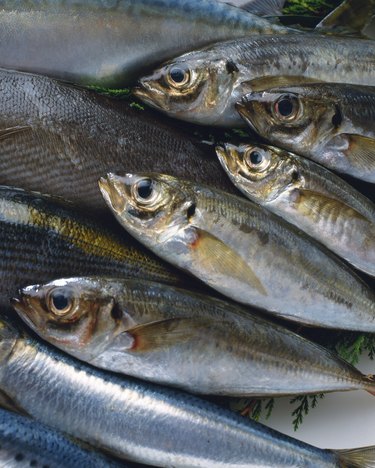
Salmon and mackerel both provide significant amounts of omega-3 fatty acids; however, salmon does provide more, according to Dr. Bruce Holub, B.Sc., Ph.D., of the DHA/EPA Omega-3 Institute. Salmon and mackerel also provide sources of vitamin D, although salmon offers more. Nutritionally speaking therefore salmon is the better choice for these vital nutrients. Salmon also tends to be low in heavy metal contaminants, while some species of mackerel contain high amounts of mercury and need to be avoided.
Omega-3 Fatty Acids
Video of the Day
Salmon and mackerel both offer good dietary sources of the omega-3 fatty acids eicosapentaenoic acid, or EPA, and docosahexaenoic acid, better known as DHA. A 100 grams serving of farmed Atlantic salmon however provides 2.15 grams of EPA and DHA combined, while the same serving of Pacific or jack mackerel nets 1.84 grams, according to the DHA/EPA Omega-3 Institute. Thus salmon is a better source for EPA and DHA.
Video of the Day
Vitamin D
Oily fish such as salmon and mackerel provide one of the few dietary sources of vitamin D. According to the National Institutes of Health Office of Dietary Supplements, food sources of vitamin D remain scarce, the optimal source being sunlight. 3 ounces of salmon offers 112 percent of the recommended daily allowance for vitamin D, while the same amount of mackerel provides 97 percent. Therefore salmon remains the superior dietary choice of vitamin D.
Health Benefits
Omega-3 fatty acids and vitamin D demonstrate the ability to positively affect numerous health conditions, particularly those related to cardiovascular disease onset. Research shows that EPA and DHA boost levels of the good cholesterol, HDL cholesterol, in the blood. EPA and DHA also decrease blood pressure and reduce inflammation. Finally, EPA and DHA minimize the risk of developing age-related macular degeneration, according to the University of Maryland Medical Center.
Pollutants
As a rule both salmon and mackerel contain negligible levels of heavy metal pollutants such as mercury compared to other species of fish. That said, one species of mackerel known as the king mackerel contains a good deal of mercury and needs to be avoided, according to the American Heart Association. King mackerel is a large predatory fish indigenous to the Gulf of Mexico and the South Atlantic. A reading of around 1 part per million of mercury in any species of fish is considered high, and king mackerel contains a 0.73 mean mercury level per parts per million. Stick to smaller species of mackerel to keep mercury intake within a safe range.
- DHA/EPA Omega-3 Institute; Dietary Sources of Omega-3 Fatty Acids; Dr. Bruce Holub, B.Sc., Ph.D., et al.
- National Institues of Health; Office of Dietary Supplements; Vitamin D; June 2011
- American Heart Association; Fish 101; May 2010
- University of Maryland Medical Center; Omega-3 Fatty Acids; Steven D. Ehrlich, N.M.D.; June 2009
- National Oceanic and Atmospheric Administration; Fish Watch - U.S. Seafood Facts; King Mackerel; May 2011
- Science Daily; Heart Failure Risk Lower in Women Who Often Eat Baked/Broiled Fish; May 2011